- Clone
- J073E5 (See other available formats)
- Regulatory Status
- RUO
- Other Names
- CC CKR3, MIP1-α receptor like-2, eotaxin receptor, MIP1-alpha receptor like-2
- Isotype
- Rat IgG2a, κ
- Ave. Rating
- Submit a Review
- Product Citations
- publications
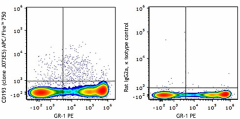
-

C57BL/6 mouse bone marrow stained with anti-mouse CD193 (clone J073E5) APC/Fire™ 750 and anti-mouse Ly-6G/Ly-6C (clone GR-1) PE (left) or Rat IgG2a, κ (clone RTK2758) APC/Fire™ 750 isotype control (right).
| Cat # | Size | Price | Quantity Check Availability | Save | ||
|---|---|---|---|---|---|---|
| 144521 | 25 µg | 176 CHF | ||||
| 144522 | 100 µg | 382 CHF | ||||
CD193, also known as CC-chemokine receptor 3 (CCR3), CC CKR3, MIP1-α receptor like-2, and eotaxin receptor, is a member of the G protein-coupled, seven transmembrane receptor family. It binds to the CC chemokines eotaxin, eotaxin-2, and eotaxin-3 with high affinity. CD193 has also been reported to bind RANTES, MCP-3, and MCP-4 with low affinity. CD193 is expressed on mouse eosinophils, basophils, mast cells, mononuclear phagocytes, platelets, hematopoietic progenitor cells, and keratinocytes. It is thought to play a role in allergic diseases such as bronchial asthma and allergic rhinitis. CD193 also function as a co-receptor for HIV-1 and HIV-2, and the binding of eotaxin with CD193 has been shown to inhibit HIV infection in some cell types.
Product DetailsProduct Details
- Verified Reactivity
- Mouse
- Antibody Type
- Monoclonal
- Host Species
- Rat
- Immunogen
- Mouse CCR3-transfectants
- Formulation
- Phosphate-buffered solution, pH 7.2, containing 0.09% sodium azide.
- Preparation
- The antibody was purified by affinity chromatography and conjugated with APC/Fire™ 750 under optimal conditions.
- Concentration
- 0.2 mg/ml
- Storage & Handling
- The antibody solution should be stored undiluted between 2°C and 8°C, and protected from prolonged exposure to light. Do not freeze.
- Application
-
FC - Quality tested
- Recommended Usage
-
Each lot of this antibody is quality control tested by immunofluorescent staining with flow cytometric analysis. For flow cytometric staining, the suggested use of this reagent is ≤ 0.25 µg per million cells in 100 µL volume. It is recommended that the reagent be titrated for optimal performance for each application.
* APC/Fire™ 750 has a maximum excitation of 650 nm and a maximum emission of 774 nm. - Excitation Laser
-
Red Laser (633 nm)
- Product Citations
-
- RRID
-
AB_2750333 (BioLegend Cat. No. 144521)
AB_2750333 (BioLegend Cat. No. 144522)
Antigen Details
- Structure
- G-protein coupled, seven transmembrane domain receptor, 356 amino acids
- Distribution
-
Eosinophils, basophils, mast, mononuclear phagocytes, platelets, hematopoietic progenitor, keratinocytes
- Function
- Co-receptor for HIV-1 and HIV-2, allergy
- Ligand/Receptor
- Eotaxin, eotaxin-2, eotaxin-3, RANTES, MCP-3, and MCP-4
- Cell Type
- Basophils, Eosinophils, Hematopoietic stem and progenitors, Mast cells, Platelets
- Biology Area
- Cell Biology, Immunology, Innate Immunity, Signal Transduction
- Molecular Family
- CD Molecules, Cytokine/Chemokine Receptors, GPCR
- Antigen References
-
1. Zlotnik A, et al. 2006. Genome Biol. 7:243.
2. Kodali RB, et al. 2004. Arterioscler. Thromb. Vasc. Biol. 24:1211.
3. Das AM, et al. 2006. J. Pharmacol. Exp. Ther. 318:411.
4. Huaux F, et al. 2005. Am. J. Pathol. 167:1485.
5. Puxeddu I, et al. 2006. J. Allergy Clin. Immunol. 117:103. - Gene ID
- 12771 View all products for this Gene ID
- UniProt
- View information about CD193 on UniProt.org
Related FAQs
- Does staining at room temperature or even at 37°C help for checking chemokine receptors expression?
-
Due to continuous recycling of many chemokine receptors, it may be worthwhile to consider staining at room temperature or at 37°C if the staining at lower temperature (which can potentially reduce receptor turnover) is not optimal.
Other Formats
View All CD193 Reagents Request Custom Conjugation| Description | Clone | Applications |
|---|---|---|
| PE anti-mouse CD193 (CCR3) | J073E5 | FC |
| Alexa Fluor® 647 anti-mouse CD193 (CCR3) | J073E5 | FC |
| FITC anti-mouse CD193 (CCR3) | J073E5 | FC |
| APC anti-mouse CD193 (CCR3) | J073E5 | FC |
| PE/Cyanine7 anti-mouse CD193 (CCR3) | J073E5 | FC |
| Brilliant Violet 421™ anti-mouse CD193 (CCR3) | J073E5 | FC |
| PerCP/Cyanine5.5 anti-mouse CD193 (CCR3) | J073E5 | FC |
| Biotin anti-mouse CD193 (CCR3) | J073E5 | FC |
| Purified anti-mouse CD193 (CCR3) | J073E5 | FC |
| APC/Fire™ 750 anti-mouse CD193 (CCR3) | J073E5 | FC |
| TotalSeq™-A0808 anti-mouse CD193 (CCR3) | J073E5 | PG |
| TotalSeq™-C0808 anti-mouse CD193 (CCR3) Antibody | J073E5 | PG |
| APC/Cyanine7 anti-mouse CD193 (CCR3) | J073E5 | FC |
| TotalSeq™-B0808 anti-mouse CD193 (CCR3) | J073E5 | PG |
Customers Also Purchased
Compare Data Across All Formats
This data display is provided for general comparisons between formats.
Your actual data may vary due to variations in samples, target cells, instruments and their settings, staining conditions, and other factors.
If you need assistance with selecting the best format contact our expert technical support team.
-
PE anti-mouse CD193 (CCR3)
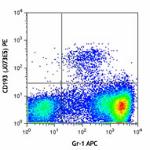
C57BL/6 mouse peripheral blood myeloid cells were stained wi... 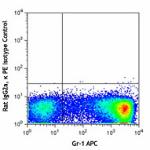
-
Alexa Fluor® 647 anti-mouse CD193 (CCR3)
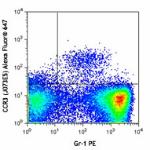
C57BL/6 mouse peripheral blood myeloid cells were stained wi... 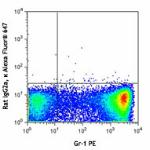
-
FITC anti-mouse CD193 (CCR3)
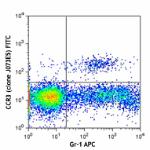
C57BL/6 mouse peripheral blood leukocytes were stained with ... 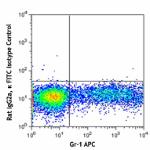
-
APC anti-mouse CD193 (CCR3)
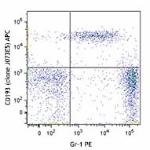
C57BL/6 mouse peripheral blood myeloid cells were stained wi... 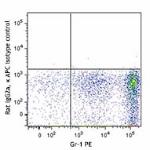
-
PE/Cyanine7 anti-mouse CD193 (CCR3)

C57BL/6 mouse peripheral blood myeloid cells were stained wi... -
Brilliant Violet 421™ anti-mouse CD193 (CCR3)
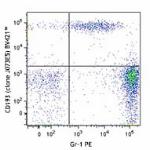
C57BL/6 mouse peripheral blood myeloid cells were stained wi... 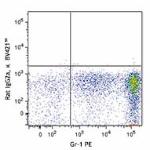
-
PerCP/Cyanine5.5 anti-mouse CD193 (CCR3)

C57BL/6 mouse bone marrow cells were stained with Gr-1 PE an... -
Biotin anti-mouse CD193 (CCR3)
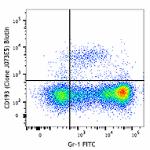
C57BL/6 mouse peripheral blood myeloid cells were stained wi... 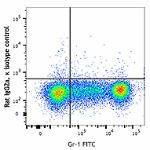
-
Purified anti-mouse CD193 (CCR3)
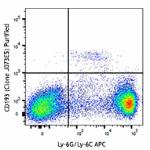
C57BL/6 mouse bone marrow stained with anti-mouse CD193 (clo... 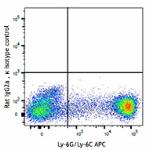
-
APC/Fire™ 750 anti-mouse CD193 (CCR3)

C57BL/6 mouse bone marrow stained with anti-mouse CD193 (clo... -
TotalSeq™-A0808 anti-mouse CD193 (CCR3)
-
TotalSeq™-C0808 anti-mouse CD193 (CCR3) Antibody
-
APC/Cyanine7 anti-mouse CD193 (CCR3)

C57BL/6 mouse peripheral blood cells were stained with Gr-1 ... -
TotalSeq™-B0808 anti-mouse CD193 (CCR3)
 Login / Register
Login / Register 











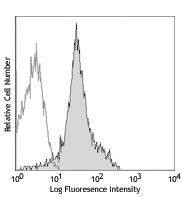
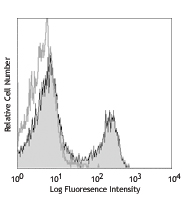
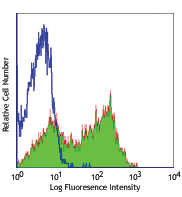




Follow Us